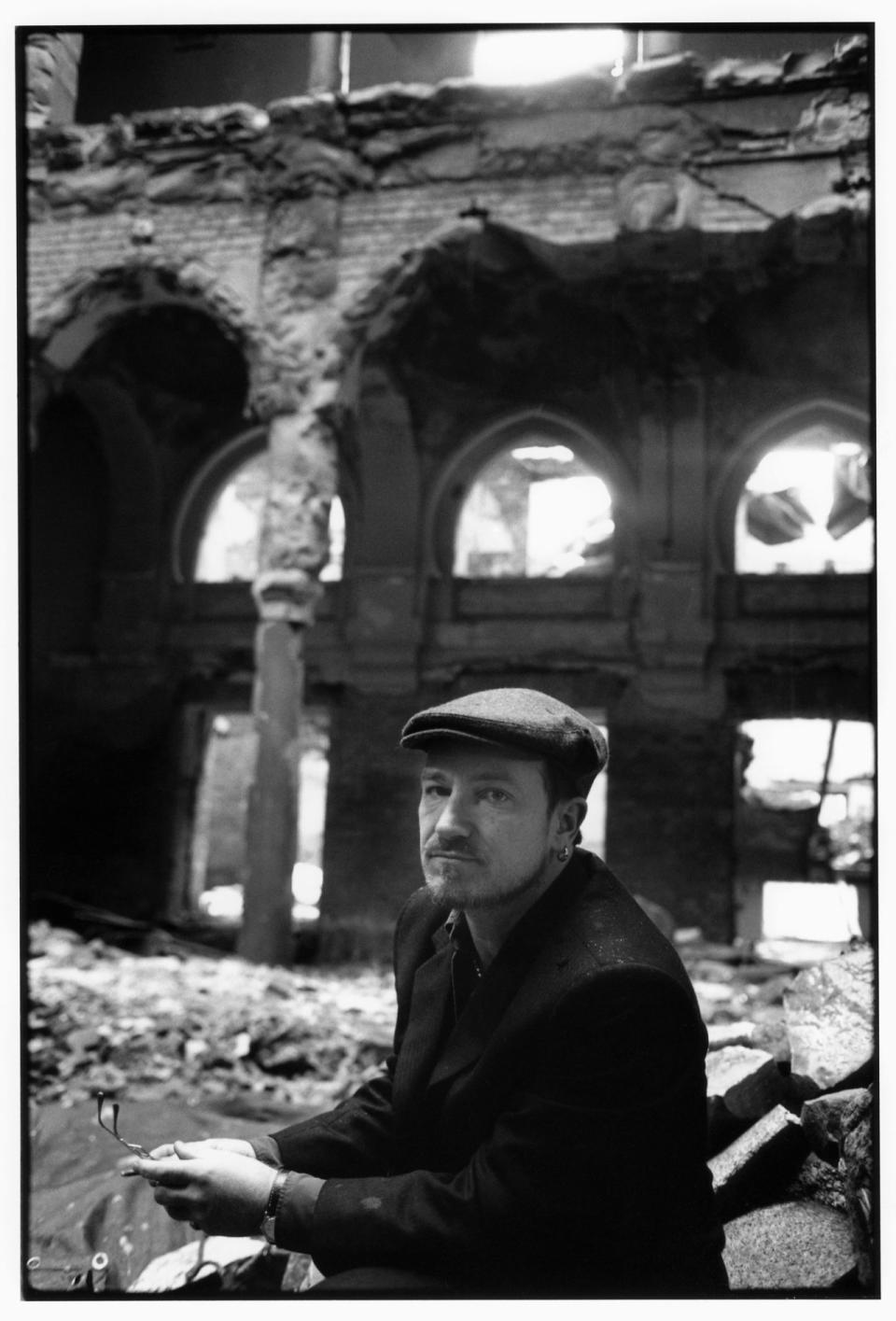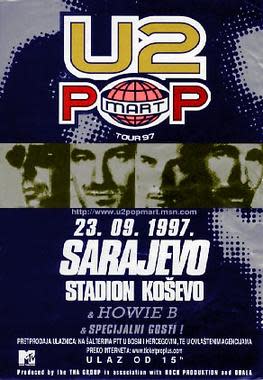SPIN 35 How U2’s Concert in War Torn Sarajevo Came About

Click here to read the full article on SPIN.
This past September 23rd was the 23rd Anniversary of one of the most famous and truly meaningful rock concerts ever staged: U2 playing Sarajevo, soon after the end of the war in Bosnia and the hellish three and a half year seige of the city.
Since then time has, as it often does, slobbered all over the occasion and preserved it in a larvae of sacchriny, revisionist myth. In reality, the road to that historic night — and it was a great night, and really did change the morale of a country — was anything but simple and sure, and in the beginning the band didn’t want to do it.
More from SPIN:
I know all this because it was entirely my idea.

Credit: In Pictures Ltd./Corbis via Getty Images
In the first few days of January 1996, just weeks after the first wars in the former Yugoslavia ended, with Serbia’s capitulation and acceptance of the Dayton Peace Accord, I met Bono, who I had never met before, in Jamaica. A friend brought me to Chris Blackwell’s house Goldeneye, the former home of immortal writer Ian Fleming. On a side table in the dining room was an original copy of a guide to birdwatching in the Caribbean, written by James Bond, whose great contribution to the 20th century was that he provided Fleming with the deliberately bland name he was seeking for his super spy and licensed assassin.
Bono and I hit it off tremendously, which meant that, after going to a number of outdoor Reggae dancehall shows, we returned to Blackwell’s house and drank until 5 in the morning, talking inexhaustedly about Irish writers, women and drinking. The next morning/noon, as we were all eating a late breakfast, Bono said he had just returned from a trip to the now freed Sarajevo and been inspired by it. “You should cover it in SPIN, Bob” he said. I told him we had already covered the wars there three times, including sending Nirvana’s Krist Novoselic to write about the conflict in his native Croatia. But Bono was right, we should cover the aftermath, and while I was trying to think of the right reporter to send there — Bono suggested, intriguingly, Sinead O’Connor’s brother — maybe he didn’t like Sinead O’Connor’s brother? — I decided I wanted to go myself.
So on a wintry February evening, having convinced fashion photographer Loren Haynes that it would be fun to come with me and photograph the youth who had survived the siege, we left New York for Sarajevo. We spent 8 days there, chronicling the indomitable and stripped down human spirit of people who made it through the war, for an article I wrote for SPIN called “Life After Death.”
Soon after I returned, Bono made an introduction to the Bosnian Ambassador for the UN, Muhammed Sacribey, who had been the heroic Foreign Minister for Bosnia during the war, and who was one of the people most responsible for forcing the Dayton Peace Accord through. Mo, as Sacribey insisted he be called, had liked my article and in early 1997 suggested we host a party at the UN for diplomats and rock stars. Honestly, that made sense at the time. I brought whoever I could get to come, and Mo gathered a small army of Ambassadors and UN aides.
I didn’t know what to expect but figured at some point we would make some remarks. What actually happened was the UN Secretary General sent a video of remarks celebrating the auspicious gathering of our two great cultures, the Deputy Secretary General spoke, followed by the Ambassadors for South Africa and Holland, each more exquisitely articulate than the last, and then Mo spoke, eloquently, powerfully, viscerally, rendering everyone in the room — the UN’s cafeteria, which is the size of a small airport hangar — emotional putty in his hands. Now it was my turn to speak. To put this in context, this would be like your high school band closing Woodstock.
I went up to the lecturn and suddenly remembered that it was exactly a year to the day when I was in Sarajevo. In fact, I said by way of an opening to the much softened audience, it was a year to the day that my friends and I stole a UN van in Sarajevo, on the last day of the Muslim month of fasting, and a night when the standard curfew was lifted to allow the Bosnians to celebrate. “Don’t worry, we gave it back,” I said, pointing out that UN security in Sarajevo was generally so lax that the locals regarded UN vehicles as a sort of DIY, free taxi service.

Credit: Ebet Roberts/Redferns
I then, to no one’s amazement more than mine, gave a powerful speech, about what it had been like to be in Sarajevo weeks after the final ceasefire, when most residents didn’t believe the war was over, and had lived through false cessations of hostilities before, only to drop their guard and be slaughtered in the streets. I described the ineffable resilience of the people who survived — not quite courage, because it was more than that and courage alone had not saved many of their neighbors, family or friends and lovers. And I said that Mo and I wanted to put on a concert in Sarajevo, watched and heard around the world by people who would never know what it was like to live in that cold darkness, and who would now, figuratively, be standing next to the people who did, and feel a kinship with them, and never again allow the world to ignore them in peril.
As I came down from the platform Mo said to me “We’re putting on a concert?”, and I said, “We are now.”

Credit: Paul Bergen/Redferns
Mo and I did not know how to put on a concert. There were perhaps not two other people on the planet less suited to do that. But we had Bono in common, so decided we’d ask U2 to do it, and work it out from there. I asked Paul McGuiness, their manager, and he said no. It wasn’t right for them, they would have to respectfully, and regrettably, pass.
So Mo and I more or less forgot about it. Sarajevo had suffered enough without the two of us creating a new disaster on their fragile, recovering infrastructure Then, some months later, McGuiness tracked me down in a San Francisco hotel and said “is that still something we can set up? Bono and the boys want to do it.”
Christened in purpose, Mo and I went to Sarajevo together in July 1997 and, due to the high regard he was held in Bosnia, met with everyone who was important. After a couple of days, we realized we really were clueless and that surely people would die because of us. This was after all a recovering war zone and the grand vision of bringing together Bosnians, Serbs and Croats, who had most recently been murdering each other, to hear live music in an open air setting, was not without imaginable pitfalls. We spent a surreal July 4th at the US Ambassador’s residence in Sarajevo and the next day we sat down in a small, smokey cafe and examined our (rather dire) situation.
Brilliantly, I presented the following plan: with the concert about two months away, we tell Bono we had absolutely no idea how to do this, and that it was going to be an epic disaster, and inconceivably dangerous to flood the city with warring ethnicities. This, I reasoned, would cause Bono to panic and immediately take over, and send his people in to set everything up, and the professionals would bail us out. That is what happened. The second thing I suggested was that we handle the security, the one area U2’s team would not have an advantage over us. Since Mo knew all the gangsters who ran the black market through the city’s labyrinth of tunnels throughout the siege, we could pick the people who would keep a lid on a potentially explosive moment. Henceforth we set up a round of meetings, in rooms so fogged with cigarette smoke that after 30 or so minutes you couldn’t see the people you were talking to and sort of blindly directed your comments to the last voice you heard. And we emerged from one particularly comical such summit most duly impressed with the flint-like hardness of a certain mafioso, and congratulated ourselves on finding our man.

And that’s how U2 came to pull off one of the most memorable concerts of the last 50 years, a show where Bono’s voice was so shredded he barely sang, mostly just speaking the lyrics that the 45,000 Croats, Bosnians and Serbs who filled the Kosevo soccer stadium sang for him. The band followed the set list for their Pop Mart tour, which they were still in the middle of, except for replacing The Edge’s enigmatic Karaoke segment with, appropriately enough, “Sunday Bloody Sunday.” They played the hits: “I Will Follow,” “New Year’s Day, “Gone,” “Desire,” “Pride (In the Name of Love),” “Still Haven’t Found What I’m Looking For” and “Even Better Than the Real Thing”, which Bono prefaced with the crowd pleasing incantation: “Viva Sarajevo! Fuck the past, kiss the future,” — a slogan for a T-shirt perhaps still waiting to happen.
In their first encore they sang “With or Without You” and “Miss Sarajevo”, written by the band and Eno and performed only once before, with Pavarotti at a benefit concert in Italy in 1995. The song is about a beauty pageant held underground during the siege, to create a kind of surreal normalcy in the hell of their daily lives. U2 almost didn’t play the song, unsure that they should until moments before coming back out, afraid they wouldn’t get it right. (They didn’t, nobody cared.)
At the time Bono called the concert “one of the toughest and one of the sweetest nights of my life” and offered that losing his voice completely by around the eighth song may have been a blessing in disguise, because it “allowed room for Sarajevo to take the gig away from us.” Larry Mullen and The Edge claimed it a highlight of their lives, Mullen saying “if I had to spend 20 years in the band just to play that show, I think it would have been worthwhile.”
And the security worked perfectly.
A version of this story was first published in The Daily Beast in 2017.
To see our running list of the top 100 greatest guitarists of all time, click here.

